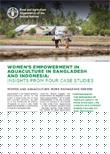Publications

Towards gender-equitable small-scale fisheries governance and development - A handbook
04/07/2017
This manual aims at providing practical guidance on how to achieve gender-equitable small-scale fisheries in the context of the implementation of the Voluntary Guidelines for Securing Sustainable Small-Scale Fisheries in the Context of Food Security and Poverty Eradication. 174 pp.

Child labour in agriculture in protracted crises, fragile and humanitarian contexts
29/06/2017
This note provides technical and operational guidance to stakeholders of the agriculture, food security and nutrition sector intervening in protracted crises, fragile and humanitarian contexts, to ensure children are not engaged in activities that could negatively affect their health, development or education, and are not employed in hazardous working conditions. 34 pp.

Women's committees in the banana industry
05/06/2017
Gender inequality in the banana industry can be seen in many forms of discrimination. Women’s committees at the workplace, company or organisational level offer a means towards fair work and increased job performance and career development, in an environment free from gender discrimination. 3 pp.

The community land rights of women and youth in Tana River and Turkana Counties
05/06/2017
In Kenya, women account for just 5% of registered land holders, while they generate 60% of farm-derived income. This report shows how communities in Tana River and Turkana counties still rely heavily on traditional land governance structures. 24 pp.

Gender Newsletter Asia Pacific June 2017
01/06/2017
This newsletter relates stories on the country level, activities, news and updates on events, publications and trainings related to the gender work in FAO in Asia and the Pacific. 7 pp.

Gender equality: Strengthening sector policies for better food security and nutrition results (Policy Guidance Note No. 6)
16/05/2017
This policy guidance note aims to facilitate dialogue on synchronizing gender equality and women’s empowerment policy objectives with those of food security and nutrition, enhancing coordination between the two domains. 40 pp.

Women's empowerment in aquaculture in Bangladesh and Indonesia: Insights from four case studies
15/05/2017
An overview of four case studies conducted in Bangladesh and Indonesia, summarizing key findings and recommendations under the initiative "Women's Empowerment in Aquaculture Production System in Asia: Comparative Case Studies and Synthesis from Bangladesh and Indonesia". 4 pp.

Caisses de résilience in Mali
10/05/2017
Launched in 2015, the three-year programme aims to improve nutrition, promote the empowerment of women and increase livelihoods resilience among agropastoral households vulnerable to food insecurity, through an integrated set of productive, social, nutritional and financial interventions. 4 pp.
